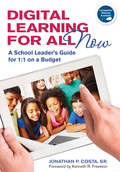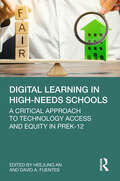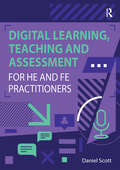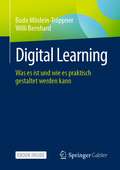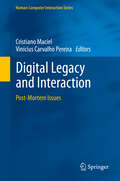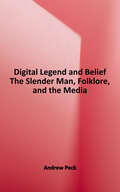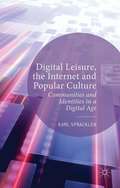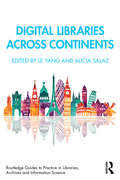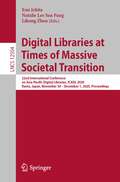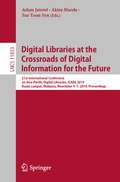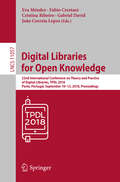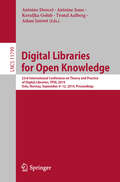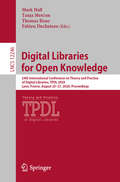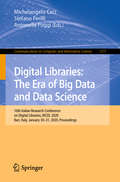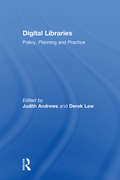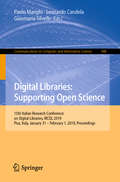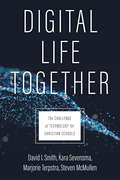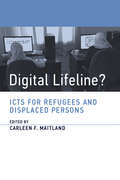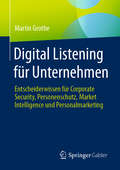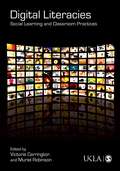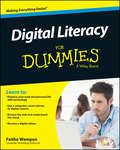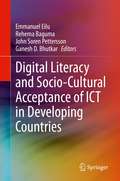- Table View
- List View
Digital Learning for All, Now: A School Leader's Guide for 1:1 on a Budget
by Jonathan P. CostaDesigning the practically paperless classroom Imagine students carrying mobile devices instead of a backpack. This breakthrough guide shows educators how to affordably transform schools into digital learning centers. Jonathan P. Costa, Sr. outlines a step-by-step road map of solutions for overcoming budget and systems barriers and moving forward with a sense of urgency. His field-tested strategies show how to: Acquire and pay for necessary equipment; Save money by utilizing open source, crowd sourcing, and Bring Your Own Device; Align instruction, assessment, curriculum, and professional development for a 21st century learning environment. A content-rich companion website provides adaptable tools, step-by-step guidance, resources, and access to an online interactive community.
Digital Learning in High-Needs Schools: A Critical Approach to Technology Access and Equity in PreK-12
by Heejung An David A. FuentesDigital Learning in High-Needs Schools examines the challenges and affordances that arise when high-needs school communities integrate educational technologies into their unique settings. Although remote, blended, and networked learning are ubiquitous today, a number of cultural, economic, and political realities—from the digital divide and digital literacy to poverty and language barriers—affect our most vulnerable and underresourced teachers and students. This book uses critical theory to compassionately scrutinize and unpack the systemic issues that impact high-needs schools’ implementation of digital learning tools. Incisive sociocultural analyses across fifteen original chapters explore the intersection of society, technology, people, politics, and education in high-needs school contexts. Informed by real-world cases pertaining to technology infrastructure, formative feedback, Universal Design for Learning, and more, these chapters illuminate how best practices emerge from culturally responsive and context-specific foundations.
Digital Learning in High-Needs Schools: A Critical Approach to Technology Access and Equity in PreK-12
by Heejung An David A. FuentesDigital Learning in High-Needs Schools examines the challenges and affordances that arise when high-needs school communities integrate educational technologies into their unique settings. Although remote, blended, and networked learning are ubiquitous today, a number of cultural, economic, and political realities—from the digital divide and digital literacy to poverty and language barriers—affect our most vulnerable and underresourced teachers and students. This book uses critical theory to compassionately scrutinize and unpack the systemic issues that impact high-needs schools’ implementation of digital learning tools. Incisive sociocultural analyses across fifteen original chapters explore the intersection of society, technology, people, politics, and education in high-needs school contexts. Informed by real-world cases pertaining to technology infrastructure, formative feedback, Universal Design for Learning, and more, these chapters illuminate how best practices emerge from culturally responsive and context-specific foundations.
Digital Learning, Teaching and Assessment for HE and FE Practitioners
by Daniel ScottAn accessible, practical and up-to-date book on digital learning and teaching, relevant for all those involved in teaching and assessment in higher and further education (HE and FE), whatever your academic or vocational specialism. Fully supports learners in developing skills for the new Diploma in Teaching (Further Education and Skills) qualification . It is essential reading for HE or FE practitioners, or those undertaking level 3, 4 and 5 qualifications in Education and Training, Postgraduate Certificates in Education (PGCEs), Certificates in Education (CertEds) and Postgraduate Certificates in Academic Practice (PGCAPs), as well as those in learning technologist roles. The impact of the Covid-19 pandemic has highlighted the importance of understanding and developing your digital capabilities as a basic competence in order to embrace current digital technologies and pedagogies to improve student outcomes. This book provides you with the practical knowledge and skills required to source and apply technology enhanced learning, teaching and assessment (TELTA) and adapt traditional learning and teaching materials and approaches for an online environment. It is designed around each aspect of the teaching and training cycle – identifying needs, planning and designing, delivering and facilitating, assessing and evaluating – and also includes: • how to build a positive and effective relationship with digital technology; • guidance on topics such as selecting appropriate digital technologies and creating digital and online activities, resources and assessments; • an emphasis on digital well-being and accessibility issues, and digital leadership; • ways of keeping up to date and continuing professional development.
Digital Learning: Was es ist und wie es praktisch gestaltet werden kann
by Bodo Möslein-Tröppner Willi BernhardDieses Buch gibt dem Leser einen Einblick in die vielfältigen Möglichkeiten, die das Digital Learning bietet. Diese kann er sogleich ausprobieren und selber anwenden. Die Autoren zeigen, wie sich 360-Grad-Lernen im virtuellen Raum umsetzen lässt (Immersive Learning) oder welche nützlichen digitalen Tools beim Lernen und in der virtuellen Zusammenarbeit (Digital Collaboration) verwendet werden können. Der Einsatz der Blockchain-Technologie in der Bildung wird genauso behandelt wie die Umsetzung praktischer digitaler Unterrichtsformen wie der Hybridunterricht als Lernform der Zukunft. Einen weiteren Schwerpunkt bildet die Künstliche Intelligenz (KI) im Digital Learning. Dazu zählen die Anwendung digitaler Sprachassistenten und wissensbasierter Applikationen zur Lösungsfindung ebenso wie die Überprüfung von Home-Based-Prüfungen. Ergänzt werden die vielfältigen Möglichkeiten des digital unterstützten Lernens durch die Anwendung des Digital Storytelling und des spielbasierten Lernens. Nach dem Lesen des Buchs weiß der Leser, was Digital Learning ist und wie es gestaltet werden kann. Für die verschiedensten Ideen und Anforderungen, die sich aus der individuellen Lern- bzw. Lehrsituation ergeben, finden sich einfach umsetzbare digitale Lösungen.
Digital Legacy and Interaction
by Cristiano Maciel Vinícius Carvalho PereiraThe views of leading researchers on the emerging topic of post-mortem digital legacy and posthumous interaction are explored in this book which combines the technical, cultural and legal aspects associated with this new branch of HCI. The technical aspects of emerging technologies, both for the web and mobile platforms, are analysed and useful information is provided for system development, requirements engineering, and data management and storage. The authors address the cultural aspects of virtual identity, ethical problems, cross-culture differences regarding memories and death, bereavement, taboos and beliefs, and the visual/verbal representations of death. The legal aspects covered include regulation, property, privacy and conflicts between international and local jurisdictions. The coverage of Digital Legacy and Interaction: Post-Mortem Issues is relevant to the development of systems that consider the influence of death, bereavement and mortality on Human Computer Interaction. The interdisciplinary approach that guides this book is intended to foster enriching and innovative discussions amongst HCI scholars and professionals. Cristiano Maciel and Vinícius Carvalho Pereira are researchers at LAVI (Laboratory of Interactive Virtual Environments) and professors at UFMT (Federal University of Mato Grosso, Brazil).
Digital Legend and Belief: The Slender Man, Folklore, and the Media
by Andrew PeckThe internet brings new urgency to the study of folklore. The digital networks we use daily amplify legends' capacity to spread swiftly, define threats, and inform action. Using the case of a particularly popular digital bogeyman known as the Slender Man, Andrew Peck brings the study of legends into the twenty-first century. Peck explains not only how legends circulate in the digital swirl of the internet but also how the internet affects how legends seep into our offline lives and into the mass media we consume. What happens, he asks, when legends go online? How does the internet enable the creation of new legends? How do these ideas go viral? How do tradition and technology interact to construct collaborative beliefs? Peck argues that the story of the Slender Man is really a story about the changing nature of belief in the age of the internet. Widely adopted digital technologies, from smartphones to social media, offer vast potential for extending traditional and expressive social behaviors in new ways. As such, understanding the online landscape of contemporary folklore is crucial for grasping the formation and circulation of belief in the digital age. Ultimately, Peck argues that advancing our comprehension of legends online can help us better understand how similar belief genres like fake news, conspiracy theories, hoaxes, rumors, meme culture, and anti-expert movements are enabled by digital media.
Digital Leisure, the Internet and Popular Culture
by Karl SpracklenThe emergence of the internet as a digital leisure space has been either ignored by leisure scholars, or breathlessly heralded as the arrival of a new age. This book explores the impact of the internet on leisure and leisure studies, considering the ways in which digital leisure spaces and activities have become part of everyday leisure. Examining the growth and importance of the internet in shaping the meaning and purpose of leisure and popular culture, Spracklen analyses whether digital leisure spaces and activities are just like any other forms of leisure. That is, that they are forms of leisure where the agency of individual users takes place in the shadow of the instrumental interests of global capitalism and nation-states. Covering a range of issues from social media and file-sharing, to commodification and romance on the Internet, this book presents new theoretical directions for digital leisure.
Digital Libraries Across Continents (Routledge Guides to Practice in Libraries, Archives and Information Science)
by Le Yang Alicia SalazDigital Libraries Across Continents illustrates how digital librarianship practitioners and scholars digitize, exhibit, and preserve their cultural heritage, and how these practices may be influenced by the policy, economic, and sociocultural environments in which they are developed.Including scholarly articles, case studies, examples of best practice, and conceptual essays solicited from different continents, this book provides an overview of the status quo of digital libraries around the globe. The case studies examine how macro-level policy, funding, and social priorities influence the development of digital libraries. The volume offers a deeper understanding of the similarities and differences between libraries in different countries and the ways in which they view, foster, develop, and sustain digital librarianship. Chapters within the book examine systems, standards, workflows, content, protocol, social and policy environments, culture, metadata, and more, through a series of case studies provided by practitioners working in these settings. Taking a comparative international approach, the book promotes the development of inclusive, accessible, and sustainable digital libraries that serve a global human knowledge endeavor.Digital Libraries Across Continents provides a wide-ranging examination of issues in cross-border digital library contexts. It will be essential reading for library practitioners, as well as information scientists and educators.
Digital Libraries and Electronic Publishing
by William Y. ArmsThe emergence of the Internet and the wide availability of affordable computing equipment have created tremendous interest in digital libraries and electronic publishing.
Digital Libraries at Times of Massive Societal Transition: 22nd International Conference on Asia-Pacific Digital Libraries, ICADL 2020, Kyoto, Japan, November 30 – December 1, 2020, Proceedings (Lecture Notes in Computer Science #12504)
by Lihong Zhou Emi Ishita Natalie Lee San PangThis book constitutes the refereed proceedings of the 22nd International Conference on Asia-Pacific Digital Libraries, ICADL 2020, which was planned to be held in Kyoto, Japan, in November/December 2020, but it was held virtually due to the COVID-19 pandemic.The 10 full, 15 short, 4 practitioners, and 10 work-in-progress papers presented in this volume were carefully reviewed and selected from 79 submissions. The papers were organized in topical sections named: natural language processing; knowledge structures; citation data analysis; user analytics; application of cultural and historical data; social media; metadata and infrastructure; and scholarly data mining.
Digital Libraries at the Crossroads of Digital Information for the Future: 21st International Conference on Asia-Pacific Digital Libraries, ICADL 2019, Kuala Lumpur, Malaysia, November 4–7, 2019, Proceedings (Lecture Notes in Computer Science #11853)
by Adam Jatowt Akira Maeda Sue Yeon SynThis book constitutes the refereed proceedings of the 21st International Conference on Asia-Pacific Digital Libraries, ICADL 2019, held in Kuala Lumpur, Malaysia, in November 2019.The 13 full, 13 short, and 5 poster papers presented in this volume were carefully reviewed and selected from 54 submissions. The papers were organized in topical sections named: text classification; altmetrics; scholarly data analysis and recommendation; metadata and entities; digital libraries and digital archives management; multimedia processing; search engines; information extraction; and posters.
Digital Libraries for Open Knowledge: 22nd International Conference on Theory and Practice of Digital Libraries, TPDL 2018, Porto, Portugal, September 10–13, 2018, Proceedings (Lecture Notes in Computer Science #11057)
by Fabio Crestani Eva Méndez Cristina Ribeiro Gabriel David João Correia LopesThis book constitutes the proceedings of the 22nd International Conference on Theory and Practice of Digital Libraries, TPDL 2018, held in Porto, Portugal, in September 2018. The 51 full papers, 17 short papers, and 13 poster and tutorial papers presented in this volume were carefully reviewed and selected from 81 submissions. The general theme of TPDL 2018 was Digital Libraries for Open Knowledge. The papers present a wide range of the following topics: Metadata, Entity Disambiguation, Data Management, Scholarly Communication, Digital Humanities, User Interaction, Resources, Information Extraction, Information Retrieval, Recommendation.
Digital Libraries for Open Knowledge: 23rd International Conference on Theory and Practice of Digital Libraries, TPDL 2019, Oslo, Norway, September 9-12, 2019, Proceedings (Lecture Notes in Computer Science #11799)
by Adam Jatowt Antoine Doucet Antoine Isaac Koraljka Golub Trond AalbergThis book constitutes the proceedings of the 23rd International Conference on Theory and Practice of Digital Libraries, TPDL 2019, held in Olslo, Norway, in September 2019. The 16 revised full papers,12 short papers and 18 poster papers presented were carefully reviewed and selected from 75 submissions. The general theme of TPDL 2019 was Connecting with Communities and so the papers attempt to facilitate establishing connections and convergences between diverse research communities such as Digital Humanities, Information Sciences and others that could benefit from ecosystems offered by digital libraries and repositories. To become especially useful to the diverse research and practitioner communities digital libraries need to consider special needs and requirements for effective data utilization, management and exploitation.
Digital Libraries for Open Knowledge: 24th International Conference on Theory and Practice of Digital Libraries, TPDL 2020, Lyon, France, August 25–27, 2020, Proceedings (Lecture Notes in Computer Science #12246)
by Mark Hall Thomas Risse Tanja Merčun Fabien DuchateauThis book constitutes the proceedings of the 24th International Conference on Theory and Practice of Digital Libraries, TPDL 2020, held in Lyon, France, in August 2020.*The 14 full papers and 4 short papers presented were carefully reviewed and selected from 53 submissions. TPDL 2020 attempts to facilitate establishing connections and convergences between diverse research communities such as Digital Humanities, Information Sciences and others that could benefit from ecosystems offered by digital libraries and repositories. The papers present a wide range of the following topics: knowledge graphs and linked data; quality assurance in digital libraries; ontology design; user requirements and behavior; research data management and discovery; and digital cultural heritage. * The conference was held virtually due to the COVID-19 pandemic.
Digital Libraries: 16th Italian Research Conference on Digital Libraries, IRCDL 2020, Bari, Italy, January 30–31, 2020, Proceedings (Communications in Computer and Information Science #1177)
by Stefano Ferilli Michelangelo Ceci Antonella PoggiThis book constitutes the thoroughly refereed proceedings of the 16th Italian Research Conference on Digital Libraries, IRCDL 2020, held in Bari, Italy, in January 2020.The 12 full papers and 6 short papers presented were carefully selected from 26 submissions. The papers are organized in topical sections on information retrieval, bid data and data science in DL; cultural heritage; open science.
Digital Libraries: Policy, Planning and Practice
by Judith AndrewsDigital Libraries: Policy, Planning and Practice brings together a wealth of international experience in the planning and implementation of digital and hybrid library projects, providing a stimulating and informative handbook and reference for library staff and information managers. It consists of chapters contributed by leading specialists from Europe, North America, South Africa and the Middle East, who offer their insight into the decision-making processes that have shaped a variety of different digitization programmes. Beginning with introductory overviews of the digital library context, the US Digital Library Program and the UK e-lib and hybrid library programmes, Digital Libraries then divides into two main sections on policy and planning, and implementation and practice. The first explores concerns such as financial and resource planning, digitized compared to born-digital content and related service issues, open access to scholarly research archives, policies for and against preservation and their justification, and evaluating electronic information services. The second section is based on case studies on major European and North American digital library projects, including the Glasgow Digital Library, UCEEL (University of Central England Electronic Library), the Networked Digital Library of Theses and Dissertations (discussed in the context of five international projects), the Indiana University music Variations and Variations2 Project, and the beginnings of the Library of Congress digital program and its integration into core library services. The concluding chapter discusses the way forward for digital libraries in the context of experiences at Tilburg University library, and possible enabling or limiting factors in the future. The result of drawing together these varied and illuminating experiences is a book that offers useful information and comparisons for all digital library project staff, institutional administrators, educators and developers of learning technology. It also provides useful pointers for researchers and project staff involved in archive and museum projects, as well as introducing students to the key ingredients of successful digital libraries.
Digital Libraries: Supporting Open Science (Communications in Computer and Information Science #988)
by Paolo Manghi Gianmaria Silvello Leonardo CandelaThis book constitutes the thoroughly refereed proceedings of the 15th Italian Research Conference on Digital Libraries, IRCDL 2019, held in Pisa, Italy, in January/February 2019. The 22 full papers and 5 short papers presented were carefully selected from 42 submissions. The papers are organized in topical sections on information retrieval, digital libraries and archives, information integration, open science, and data mining.
Digital Life Together: The Challenge of Technology for Christian Schools
by David I. Smith Steven McMullen Kara Sevensma Marjorie TerpstraDigital technologies loom large in the experience of today&’s students. However, parents, teachers, and school leaders have only started to take stock of the ramifications for teaching, learning, and faith. Based on a three-year in-depth study of Christian schools, Digital Life Together walks educators, school leaders, and parents through some of the big ideas that are hidden in our technology habits, going beyond general arguments for or against digital devices to address the nuanced realities of Christian education in a twenty-first-century context.
Digital Life Together: The Challenge of Technology for Christian Schools
by David I. Smith Steven McMullen Kara Sevensma Marjorie TerpstraDigital technologies loom large in the experience of today&’s students. However, parents, teachers, and school leaders have only started to take stock of the ramifications for teaching, learning, and faith. Based on a three-year in-depth study of Christian schools, Digital Life Together walks educators, school leaders, and parents through some of the big ideas that are hidden in our technology habits, going beyond general arguments for or against digital devices to address the nuanced realities of Christian education in a twenty-first-century context.
Digital Lifeline?: ICTs for Refugees and Displaced Persons (Information Policy)
by Carleen F. MaitlandInterdisciplinary perspectives on the role of new information technologies, including mobile phones, wireless networks, and biometric identification, in the global refugee crisis.Today's global refugee crisis has mobilized humanitarian efforts to help those fleeing persecution and armed conflict at all stages of their journey. Aid organizations are increasingly employing new information technologies in their mission, taking advantage of proliferating mobile phones, remote sensors, wireless networks, and biometric identification systems. Digital Lifeline? examines the use of these technological innovations by the humanitarian community, exploring operations and systems that range from forecasting refugee flows to providing cellular and Internet connectivity to displaced persons. The contributors, from disciplines as diverse as international law and computer science, offer a variety of perspectives on forced migration, technical development, and user behavior, drawing on field work in countries including Jordan, Lebanon, Rwanda, Germany, Greece, the United States, and Canada. The chapters consider such topics as the use of information technology in refugee status determination; ethical and legal issues surrounding biometric technologies; information technology within organizational hierarchies; the use of technology by refugees; access issues in refugee camps; the scalability and sustainability of information technology innovations in humanitarian work; geographic information systems and spatial thinking; and the use of “big data” analytic techniques. Finally, the book identifies policy research directions, develops a unified research agenda, and offers practical suggestions for conducting displacement research.ContributorsElizabeth Belding, Karen E. Fisher, Daniel Iland, Lindsey N. Kingston, Carleen F. Maitland, Susan F. Martin, Galya Ben-Arieh Ruffer, Paul Schmitt, Lisa Singh, Brian Tomaszewski, Mariya Zheleva
Digital Listening für Unternehmen: Entscheiderwissen für Corporate Security, Personenschutz, Market Intelligence und Personalmarketing
by Martin GrotheDieses Buch zeigt für Entscheider auf, wie Unternehmen die Inhalte im digitalen Raum erschließen und so ihre Sicherheit und Wettbewerbsposition entscheidend stärken. Digital Listening heißt, das Internet als Meinungs- und Informationsraum ernst zu nehmen und durch qualifizierte Analysen die eigene Sicht zu verbessern.Martin Grothe erklärt mit einem durchgängigen Prozessleitfaden sowie den notwendigen Hintergründen und Tools, wie Sie mit Digital Listening Ihr Sicherheitslagebild, eine Früherkennung von Bedrohungen, die Zielgruppenkommunikation, das Personalmarketing sowie den Schutz exponierter Persönlichkeiten wegweisend ausbauen.Führungskräfte erhalten Einblicke in mehrere Fachbereiche, aber auch den notwendigen Überblick: Sie finden einen strukturierten Zugang zu verfügbaren Tools, blicken in das Darknet, nehmen Reporting-Formate als Vorlagen auf, schlüpfen in die Rolle der dunklen Seite, hören Influencern zu und deklinieren einen Strategiefahrplan zum Engagement-Aufbau als Arbeitgeber durch. Wer Entwicklungen früher erkennt, Kontexte genauer versteht und Kommunikation passgenauer formuliert, der kann die Zukunft aktiver gestalten.Aus dem Inhalt Sicherheit und Wettbewerb in digitalen Zeiten: Digital Listening und die dunkle SeiteIntelligence Cycle: Vorgehen und Tools (Open Source, Advanced)Unternehmenssicherheit: Desinformation, Data-Breaches und der G20-CasePersonenschutz: Angriffsvektoren und SichtbarkeitsanalysenMarket Intelligence: Personalmarketing, Influencer, AI, CounterintelligenceGestaltungsaufgabe für das Management: Integration und AusblickViele Case Studies und Skizzen mit konkreten EinsatzszenarienMit Gastbeiträgen vonHeinz-Werner Aping (Direktor beim BKA a.D.)Prof. Dr. Peter Gentsch (Intelligence Group)Friedrich Christian Haas (AKE Group)Jerry Hoffmann (Counteraction)Udo Hohlfeld (INFO + DATEN)Samira Mousa (healthy content)Chris West (Counteraction)Klaus Pfeifer (Pinkerton)
Digital Literacies: Social Learning and Classroom Practices (Published in association with the UKLA)
by Victoria Carrington Muriel RobinsonFacebook, blogs, texts, computer games, instant messages… The ways in which we make meanings and engage with each other are changing. Are you a student teacher trying to get to grips with these new digital technologies? Would you like to find ways to make use of them in your classroom? Digital technologies are an everyday part of life for students and Understanding Digital Literacies explores the ways in which they can be used in schools. Carrington and Robinson provide an insight into the research on digital technologies, stressing its relevance for schools, and suggest ways to develop new, more relevant pedagogies, particularly for social learning, literacy and literate practices. With a practical focus, the examples and issues explored in this book will help you to analyse your own practice and to carry out your own small-scale research projects. Explaining the theoretical issues and demonstrating their practical implementation, this topical book will be an essential resource to new student teachers on undergraduate and PGCE courses, and those returning to postgraduate study.
Digital Literacy For Dummies
by Faithe WempenDevelop and implement essential computer technology--with confidenceDo you want to develop an understanding of technology to enhance your education, career, or personal life, but feel inhibited by your digital literacy? Fear not! Written in plain English and absent of undecipherable high-tech jargon, Digital Literacy For Dummies makes it easy to get a grip on computer basics, the Internet, the Cloud, browsing the web, productivity programs and applications for school and the workplace, computer security and privacy, the latest in digital lifestyle topics, and so much more.Walks you through the basics of developing essential computer technology skillsShows you how to gain the digital literacy skills required to succeed in education, at home, and in the workforceExplains how the use of smartphones and digital cameras contribute to digital literacyWith the introduction of 3G and 4G services in emerging countries like India, worldwide Internet usage is increasing exponentially. With this technological growth comes an opportunity for people of all ages and from all walks of life to learn new skills to keep them ahead of the curve. Packed with easy-to-follow explanations and seasoned with a bit of humor and fun, Digital Literacy For Dummies makes it easy and accessible for anyone to harness the power of technology to remain relevant in school or at work.
Digital Literacy and Socio-Cultural Acceptance of ICT in Developing Countries
by Emmanuel Eilu Rehema Baguma John Soren Pettersson Ganesh D. BhutkarThis book discusses the role of human computer interaction (HCI) design in fostering digital literacy and promoting socio-cultural acceptance and usage of the latest ICT innovations in developing countries. The book presents techniques, theories, case studies, and methodologies in HCI design approaches that have been used to foster digital literacy, break the socio-cultural barriers to ICT adoption, and promote the widespread usage of the latest innovations in the health, agriculture, economic, education and social sectors in developing countries. The authors provide insights on how crossing disciplines in HCI such as usability design, user centered design, user experience, anticipated user experience, technology acceptance design, persuasive design, philosophical designs, motivational design, social-cultural oriented designs, and other HCI design approaches have promoted digital literacy and stimulated socio-cultural acceptance and the usage of the latest ICT innovations. The book is relevant in academic, industry and government.Presents theoretical, practical, and socio-cultural approaches to digital literacy challenges in developing countries;Discusses recent ICT and HCI innovations used to transform the health, agriculture, economic, education and social sectors in developing countries;Provides insights on design opportunities and challenges presented in countries where digital literacy is very low and with complex socio-cultural dynamics.
